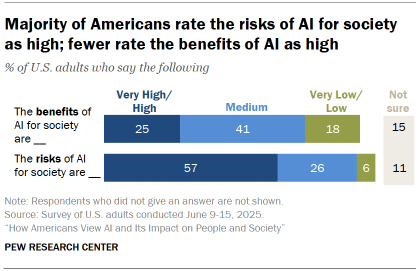Key findings
- A majority of Americans (57%) rate the risks of AI for society as high. Far fewer (25%) see high benefits, while 15% rate both the risks and the benefits as significant.
- Our survey asked respondents to explain, in their own words, the main reason they see AI as having high or low benefits or risks for society. Those who rate AI negatively most commonly say AI erodes human abilities and connections. Those who see high benefits most often cite gains in efficiency.
When asked to rate separately both the benefits and risks of artificial intelligence, far more Americans rate the risks of AI as high than rate the benefits as high.

A majority of U.S. adults (57%) say the risks of AI for society are high or very high. Smaller shares rate the risks of AI as medium (26%), low or very low (6%), or say they are not sure (11%).
In contrast, a quarter of Americans rate the benefits of AI for society as very high or high. Another 41% of Americans see some advantages of AI, rating the benefits as medium. At the other end of the spectrum, 18% rate the benefits of AI as low or very low. And 15% are unsure.
Some people see both risks and benefits of AI: 15% rate both as high.
What people told us about the risks and benefits of AI
The survey asked Americans to tell us the main reason they rated the benefits or risks of AI as very low or low, or as very high or high, for society. The following section summarizes the key themes in people’s responses about the risks and benefits of AI.
Reasons why Americans see high risks of AI
Among the 57% of Americans who rate the risks of AI for society as high or very high, the most common reason was concerns about AI eroding human abilities and connections, such as making people lazy or less able to think creatively or critically (27%). As one woman put it:

“I think a sizable portion of humanity is inclined to seek the path of least resistance. As annoying and troublesome as hardships and obstacles can be, I believe the experience of encountering these things and overcoming them is essential to forming our character.” – Woman, age 30-39
A teacher pointed to concerns about children developing skills like curiosity, problem-solving and critical thinking:
“As a school teacher, I understand how important it is for children to develop and grow their own curiosity, problem-solving skills, critical thinking skills and creativity, to name just a few human traits that I believe AI is slowly taking over from us. Since children are digital natives, the adults who understand a world without AI need to still pass the torch to children for developing these human qualities with our own human brains, instead of relying on the difficulty to be passed on to AI so that humans don’t have to feel the struggle of what real learning is.” – Woman, age 40-49
Some Americans (18%) also say the main reason they rate the risks as high is the negative impact AI could have on accurate information, such as making it harder to tell what is real and what was created by AI. For example:
“Misinformation is already a huge problem and AI can create misinformation a lot faster than people can.” – Man, age 30-39
Another commonly cited reason for rating the risks as high is concerns over people’s ability to control AI (17%). One man wrote:
“Society will be too slow to regulate and control AI. The technology will advance rapidly and outpace our ability to anticipate outcomes (both positive and negative). It will therefore be extremely difficult to implement and deploy risk management strategies, plans, policies and legislation to mitigate the upheaval that AI has the real potential to unleash on every member of our society” – Man, age 60-69
Finally, some (11%) worry about the use of AI for nefarious purposes, including crime. As one respondent wrote:
“AI can very easily be used to fake people’s likeness and voice. This is absolutely dangerous in the hands of criminals or other dishonest people. Identities can be stolen; innocent people could be framed for doing or saying things they didn’t do/say.” – Man, age 40-49
Reasons why Americans see high benefits of AI

Among the 25% who say the benefits of AI are high or very high, the most commonly cited reason is efficiency gains that would free people up to use their time in better ways (41%).
“AI takes mundane tasks that often waste talent and effort and allows us to automate them. AI also allows us to access information in a more streamlined way and allows us to save something that we can never get back: time!” – Man, age 30-39
“AI has the potential to make society more efficient than ever. AI sort of transcends time and space in that it can be used to study the past, inform the present, and shape the future. It can be used by individuals, by corporations, by governments.” – Woman, age 20-29
Others (23%) pointed to the possibility that AI would expand human and technological abilities, such as leading to more rapid scientific and medical developments or increasing access to information. One older respondent focuses on its possibility to improve health care:
“Use of AI could significantly speed diagnosis of medical issues. Now we rely on any given doctor’s ability to know about certain conditions. [This is] a real issue particularly in rural areas.” – Woman, age 60-69
The survey also asked respondents the main reason they rated the benefits for society as low or very low. About one-third pointed toward the concern that AI will erode human abilities and connections. This was also the most common reason for rating the risks as high. Refer to the Appendix for more. (The sample size for those who say the risks are low or very low is too small to analyze.)






